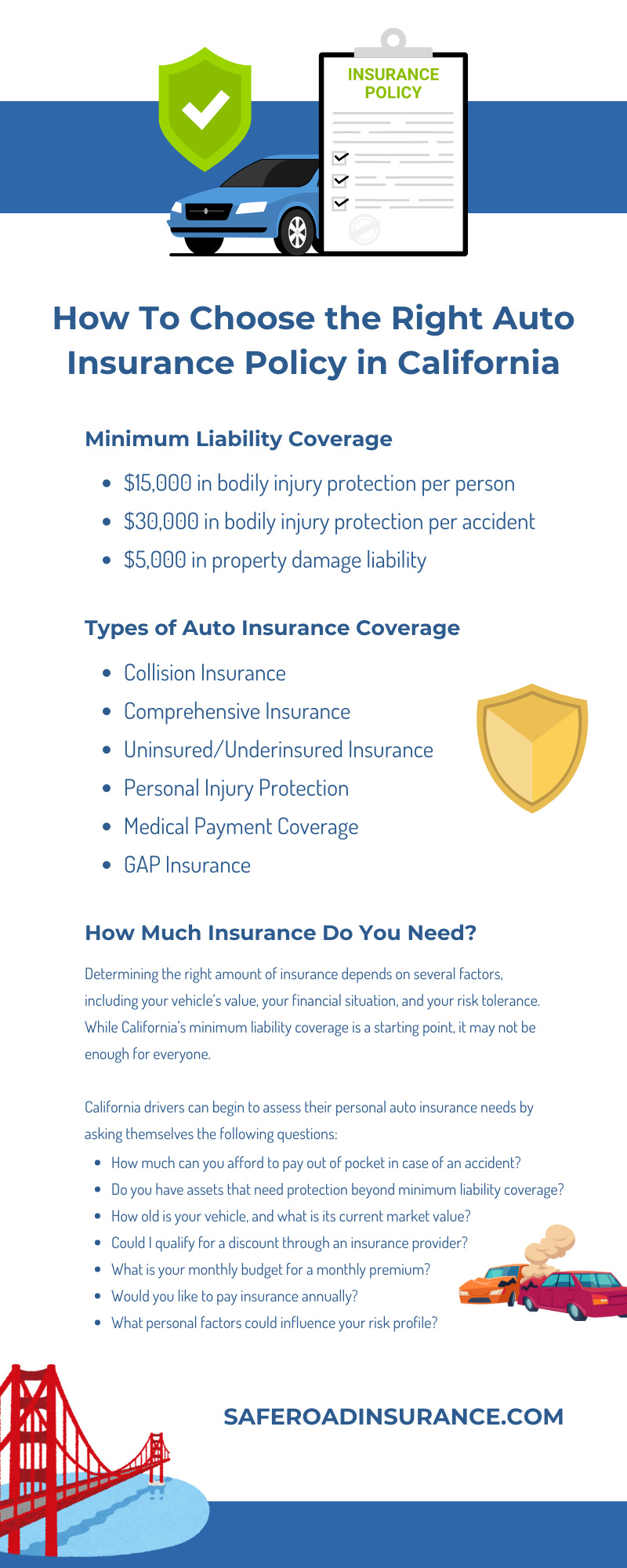
Owning and operating a vehicle in the Golden State is a privilege that entails several responsibilities, including purchasing auto insurance. Insurance is crucial for protecting yourself and your vehicle after a collision or accident that can cause damage and financial burden.
If you’re a California driver or shopping for an auto insurance policy, understanding how to choose the right coverage amount, deductible, and provider is vital. These choices all factor into your preparedness for an accident, so it’s important to know what you’re paying for and what you can expect in return. This post will guide you through the key aspects of auto insurance policies, helping you make informed decisions and find the best fit for your needs.
California’s Auto Insurance Requirements
In the state of California, having auto insurance is not only important for your own peace of mind but also required by law. The state mandates a minimum level of liability coverage to ensure that drivers can cover costs related to injuries or property damage they may cause to others. Driving without insurance is a serious criminal offense and does not protect you against financial losses to pay damages to another driver involved in an accident.
Minimum Liability Coverage
Below, we have outlined the amount of minimum liability insurance all California drivers must acquire to legally operate their vehicles.
- $15,000 in bodily injury protection per person
- $30,000 in bodily injury protection per accident
- $5,000 in property damage liability
This coverage is designed to protect other drivers, passengers, and pedestrians in the event of an accident. More specifically, bodily injury protection pays for any injuries or death caused to another person in an accident that you were at fault for. Property damage liability covers any damage caused to someone else’s property, such as their vehicle or personal property. However, these minimums may not be sufficient in severe accidents, making it essential to consider additional coverage options.
Types of Auto Insurance Coverage
Understanding the different types of auto insurance coverage drivers can add to their policies can help you make a more informed choice. Below are several key types to consider.
Collision Insurance
Collision insurance covers damages to your vehicle resulting from a collision with another car or object, regardless of fault. It will help cover repair costs or the replacement value of your car in case of an accident.
Comprehensive Insurance
Comprehensive insurance covers non-collision-related damages to your car, including but not limited to theft, vandalism, natural disasters, and animal-related incidents. For example, if a tree falls on your car during a storm, comprehensive insurance would cover the repair costs. When paired with collision insurance, this combination is sometimes referred to as full-coverage auto insurance.
Uninsured/Underinsured Insurance
Uninsured/underinsured motorist coverage protects you if you are involved in an accident with a driver who either has no insurance or insufficient coverage. Given the number of uninsured drivers on the road, this type of insurance can provide peace of mind and financial protection in such scenarios.
Personal Injury Protection
Personal injury protection (PIP) covers medical expenses for you and your passengers, regardless of who is at fault in an accident. PIP can also cover lost wages and other related costs, ensuring that you are not financially burdened by accident-related injuries.
Medical Payment Coverage
Medical payment coverage, similar to PIP, covers medical expenses for you and your passengers. However, it does not cover lost wages or other costs and tends to have lower policy limits. It is a good option for those who want to ensure their medical bills are covered without the additional benefits of PIP.
GAP Insurance
Guaranteed asset protection (GAP) insurance is a great addition to your auto policy if you have a loan or lease on your vehicle. It covers the difference between the actual cash value of your car and the amount you owe on your loan or lease. This can be crucial if your car is totaled and you owe more than it’s worth.
How Much Insurance Do You Need?
Determining the right amount of insurance depends on several factors, including your vehicle’s value, your financial situation, and your risk tolerance. While California’s minimum liability coverage is a starting point, it may not be enough for everyone.
Evaluating Your Needs
California drivers can begin to assess their personal auto insurance needs by asking themselves the following questions:
- How much can you afford to pay out of pocket in case of an accident?
- Do you have assets that need protection beyond minimum liability coverage?
- How old is your vehicle, and what is its current market value?
- Could I qualify for a discount through an insurance provider?
- What is your monthly budget for a monthly premium? Would you like to pay insurance annually?
- What personal factors could influence your risk profile?
Answering these questions can help you decide whether you need additional coverage, such as collision, comprehensive, or uninsured/underinsured motorist insurance. Additional coverage is often incredibly beneficial for ensuring comprehensive protection against unforeseen circumstances that may exceed standard policy limits.
Balancing Cost and Coverage
Finding the right balance between cost and coverage is essential. While more comprehensive coverage provides better protection, it also comes with higher premiums that can strain your budget. Look for ways to save money without compromising on essential coverage.
Consider selecting a higher deductible or balancing your coverage total to the worth of your car if it makes more financial sense. Comparing quotes from different providers and taking advantage of discounts can help you strike the right balance.
The Importance of Auto Insurance
Auto insurance is a necessary and valuable investment for California drivers. Understanding state requirements, evaluating your needs, and finding the right auto insurance policy can provide peace of mind while driving on the Golden State roads. Remember to review your policy regularly and make changes as needed to ensure you always have adequate protection.
Drivers looking for cheap car insurance in California should consider purchasing a policy from Saferoad Insurance. We offer tailored coverage options for California drivers looking for affordable rates and protection for their vehicles. You can even save more money when bundling homeowner or renter’s insurance with us. Fill out an online quote form today to discover how much you could be saving.
